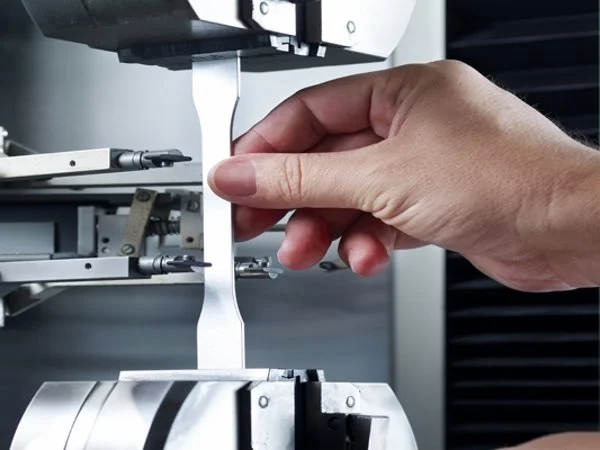ASTM E399 Plane Strain Fracture Toughness Test
The ASTM E399 Plane Strain Fracture Toughness (PSFT) test is a critical method used to determine the fracture toughness of materials, particularly in the context of oil and gas testing. This test assesses how well a material can resist cracking under stress, which is essential for ensuring the integrity and safety of components in oil and gas operations.
The PSFT measures the energy absorbed by a specimen during crack growth to the point of fracture under controlled conditions. The primary parameter evaluated is the KIC, or critical strain energy release rate, which provides insights into how resistant a material is to cracking under stress. This test is particularly important for materials that will be used in high-stress environments like those found in oil and gas exploration and production.
The ASTM E399 PSFT involves the use of a compact tension specimen with a central crack, subjected to uniaxial tensile loading. The test requires precise control over specimen geometry, loading rate, and temperature conditions. The methodology is governed by strict standards like ASTM E399-18 (Reapproved 2021), which outlines the procedure for conducting this test.
For oil and gas applications, the PSFT is used to evaluate materials that are exposed to high stresses during drilling, piping, and other critical operations. The results of this test help in selecting materials that can withstand the rigors of these environments, thereby minimizing the risk of failure under operational stress.
The testing process involves several steps:
- Specimen preparation: Precise machining is required to ensure the specimen meets ASTM E399 specifications for geometry and surface finish.
- Loading: The specimen is loaded in a compact tension setup using a hydraulic or pneumatic testing machine capable of providing controlled loading rates.
- Data collection: Crack growth and fracture are monitored using strain gauges, video image analysis (VIA), or other non-destructive evaluation methods. This data is used to calculate the KIC value.
The ASTM E399 PSFT test is essential for ensuring that materials meet stringent quality and safety standards in oil and gas operations. It provides critical information about material behavior under stress, which can help prevent failures and improve the overall reliability of equipment used in these industries.
Applied Standards
The ASTM E399 Plane Strain Fracture Toughness Test is governed by several international standards that ensure its accuracy and repeatability. The primary standard is ASTM E399-18, which was last revised in 2018 and reapproved in 2021.
Other relevant standards include:
- ISO 15630-1:2019, which provides a framework for evaluating fracture toughness in materials used in oil and gas applications.
- IEC 61147-1, which covers the use of PSFT in the evaluation of materials for electrical equipment.
These standards ensure that the ASTM E399 test is conducted consistently across different laboratories, providing reliable and comparable results. The use of these international standards also enhances the credibility and acceptance of test results within the global oil and gas industry.
Eurolab Advantages
At Eurolab, we offer comprehensive ASTM E399 Plane Strain Fracture Toughness testing services tailored to meet the unique needs of the oil and gas sector. Our expertise in this area ensures that our clients receive accurate, reliable, and timely test results.
- Accurate Testing Equipment: We utilize state-of-the-art testing machines capable of providing precise control over loading rates and environmental conditions.
- Experienced Technicians: Our team comprises highly skilled professionals with extensive experience in conducting ASTM E399 tests, ensuring consistent quality in every test we perform.
- Comprehensive Reporting: Eurolab provides detailed reports that include all relevant data and interpretations, helping our clients make informed decisions about material selection.
- Customized Solutions: We work closely with each client to understand their specific requirements and offer customized testing solutions.
Our commitment to excellence in ASTM E399 testing ensures that we deliver accurate results that meet or exceed industry standards. With Eurolab, you can be confident in the quality of your material selection for oil and gas applications.
Why Choose This Test
- Critical for Safety: The ASTM E399 PSFT is essential for ensuring that materials used in high-stress environments are capable of withstanding the rigors of these conditions without failure.
- Comprehensive Evaluation: It provides a comprehensive evaluation of material toughness, which is crucial for long-term reliability and safety.
- International Recognition: Results from this test are widely accepted in the global oil and gas industry, enhancing the credibility of your materials.
- Regulatory Compliance: By using ASTM E399 tests, you can ensure that your materials comply with relevant regulations and standards.
- Precision and Consistency: Our testing methods are precise and consistent, providing reliable results every time.
The ASTM E399 Plane Strain Fracture Toughness Test is a cornerstone of material evaluation in the oil and gas sector. Its importance cannot be overstated, as it helps prevent costly failures and ensures the safety of personnel and equipment.





